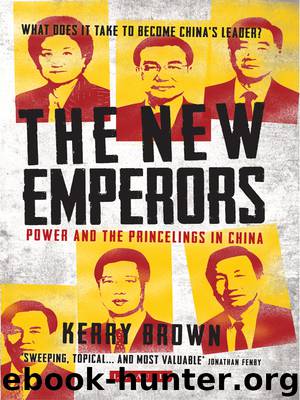New Emperors, The by Brown Kerry

Author:Brown, Kerry
Language: eng
Format: epub
ISBN: 9780857733832
Publisher: I.B.Tauris
Published: 2014-03-14T16:00:00+00:00
4
THE LAWYER: PREMIER LI KEQIANG
Li Keqiang can consider himself unlucky. Described in 2001 by Cheng Li of Brookings Institute, Washington, as a ‘rising star’, he was slated more persistently as the likeliest successor to Hu up till 2007.1 Li has impressed those who have met him with his intelligence and his smooth operating style. He was one of the first leaders to meet AIDS sufferers, a disease that has attracted particular stigma in China over the last two decades, and the handling of which is something that Li himself has been closely associated with.2 Three aspects of his career stand out. The first is his legal background, which makes him the first ever member of the Standing Committee of the Politburo in Chinese history to be legally trained. The second is his management of crisis. Unlike Xi, he has managed far tougher and more contentious provinces – Liaoning and Henan. Both threw difficult challenges at him. He allows us to understand how important the management of crises is in contemporary Chinese politics and society, but also what the role of these are and how they occur. Finally, he seems to come from a humble, grassroots background, like his mentor Hu Jintao. But once more, looking harder at his patronage and family links one sees something a little more complicated. The nature of his networks is different from Xi’s, but it would be wrong to claim that he did not start off with some inherited and acquired networks. These will be figured out later in this chapter.
Perhaps the highest-profile incident after Li Keqiang was appointed to the Standing Committee of the Politburo in October 2007 that made people focus on him was the visit he made in August 2011 to Hong Kong. During his speech to the students, Li had talked of ‘100 years of Hong Kong University, of cultural accumulation [...] training so many personnel’, following this with the grand statement that ‘this was for the glory of Hong Kong and a great contribution to the motherland’.3 In his speech, he suddenly broke into English, declaring that ‘The University of Hong Kong was used to be for China and the World’ (sic), continuing in English for two minutes.4 Even this use of a few words of English, particularly in Hong Kong, was controversial. Critics inside and outside China wondered why it was that in a place that had been run by the British until 1997, Li would use the language of the oppressors. Did this betray some secret admiration in him for the old colonial masters? Had he some latent cultural cringe, a fatal strain of self-doubt and lack of confidence that meant he belonged to those Chinese accused of looking up to the old, loathed masters?5 Interpretations like this in various levels of disguise swirled around in cyberspace to and fro across the Great Firewall of China.
The bigger news was more about the extraordinary amounts of security that surrounded Li as he went to and from the university. The
Download
This site does not store any files on its server. We only index and link to content provided by other sites. Please contact the content providers to delete copyright contents if any and email us, we'll remove relevant links or contents immediately.
| Arms Control | Diplomacy |
| Security | Trades & Tariffs |
| Treaties | African |
| Asian | Australian & Oceanian |
| Canadian | Caribbean & Latin American |
| European | Middle Eastern |
| Russian & Former Soviet Union |
The Secret History by Donna Tartt(19088)
The Social Justice Warrior Handbook by Lisa De Pasquale(12190)
Thirteen Reasons Why by Jay Asher(8909)
This Is How You Lose Her by Junot Diaz(6886)
Weapons of Math Destruction by Cathy O'Neil(6279)
Zero to One by Peter Thiel(5801)
Beartown by Fredrik Backman(5754)
The Myth of the Strong Leader by Archie Brown(5507)
The Fire Next Time by James Baldwin(5444)
How Democracies Die by Steven Levitsky & Daniel Ziblatt(5218)
Promise Me, Dad by Joe Biden(5153)
Stone's Rules by Roger Stone(5087)
A Higher Loyalty: Truth, Lies, and Leadership by James Comey(4962)
100 Deadly Skills by Clint Emerson(4925)
Rise and Kill First by Ronen Bergman(4788)
Secrecy World by Jake Bernstein(4753)
The David Icke Guide to the Global Conspiracy (and how to end it) by David Icke(4717)
The Farm by Tom Rob Smith(4507)
The Doomsday Machine by Daniel Ellsberg(4490)
